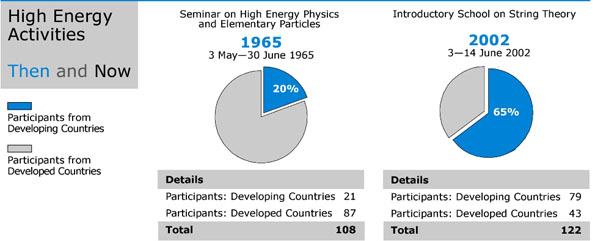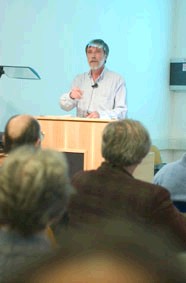Personal tools
News from ICTP 108 - Dateline

Lending a Hand
in Africa
"Hardly a PhD physicist in East Africa has not had an association
with ICTP." That's the conclusion of Edmund Zingu
in a Physics Today article, "Promoting Physics and
Development in Africa," published in January. Zingu is the
academic vice principal at Mangosuthu Technikon, Durban, South
Africa. Zingu laments the minimal presence of science in general
and physics in particular throughout Africa. For example, in east
Africa (stretching from Sudan in the north to Swaziland in the
south), there is one PhD physicist for every 2 million people;
in South Africa, there is one PhD physicist for every 140,000
people; and in the United States, one for every 8000 people. Zingu
praises ICTP for providing resources and opportunities for African
physicists who work under extremely difficult conditions and often
in isolation. Led by reform policies in South Africa, Kenya and
several other African nations, Zingu believes that the continent
now has a chance to make meaningful progress in developing its
capacity in physics and other scientific disciplines in the years
ahead. He acknowledges, however, that there is a long, long way
to go. For a full text of the article, see www.aip.org/pt.
Nobel Laureate Rudolph Marcus

Rudolph A. Marcus, Nobel Prize in Chemistry 1992 and
Arthur Noyes Professor of Chemistry, California Institute of Technology,
lectured on "Strange Isotope Effects in Ozone Formation and
Implications for the Earliest Solar System" on 26 January,
in the Centre's Main Lecture Hall. Marcus won the Nobel Prize
in Chemistry 1992 "for his contributions to the theory of
electron transfer reactions in chemical systems."
New Staff Member
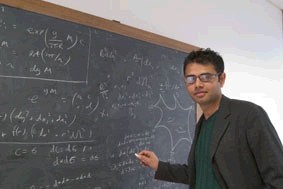
Bobby Acharya has joined the ICTP High Energy Physics
group. Before arriving in Trieste, Acharya, who was born in Uganda
and raised in the UK, served as a research associate at Rutgers
University in New Jersey, USA. Acharya studied theoretical physics
at Imperial College and Queen Mary College, earning a PhD degree
in 1997. Following a three-year fellowship with the Particle Physics
and Astronomy Research Council of England, he went to the USA
in 2000, remaining there until his appointment to ICTP this January.
Panza Honoured
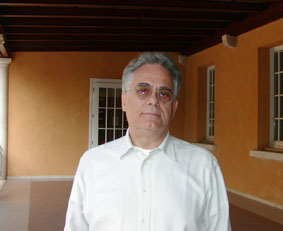
Giuliano F. Panza, head of the Structure and Non-Linear
Dynamics of the Earth (SAND) group and professor of earth sciences
and physics at the University of Trieste, has been elected to
the National Academy of Sciences "detta dei XL."
Panza is being honoured for his broad-ranging contributions to
research and training in the field of seismic hazards. Established
in 1782, the academy honours Italy's most prominent scientists.
For additional information, see www.accademiaxl.it.
InterAcademy Council Report
The InterAcademy Council (IAC), an Amsterdam-based organisation created by the world's national science academies to provide expert knowledge and advice to international bodies, has issued its first report: Inventing a Better Future: A Strategy for Building Worldwide Capacities in Science and Technology. Jacob Palis, chairperson of the ICTP Scientific Council and co-chair of the report's study panel, presented the report's findings to UN Secretary General Kofi Annan at UN headquarters in New York City. At the ceremony, Palis spoke about ICTP's and the Third World Academy of Sciences' (TWAS) long-standing contributions to the advancement of science in the South and urged others to draw on the work of these two Trieste-based institutions in future efforts to promote science in the developing world. The full text of the report can be found at www.interacademycouncil.net.
Goddard to Princeton
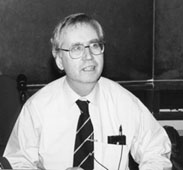
Peter Goddard, who counts ICTP's Dirac Medal among his
most prestigious awards, has been appointed director of the Institute
for Advanced Study in Princeton, New Jersey, USA. Goddard previously
held the post of master of St. John's College at the University
of Cambridge, UK. He is considered one of the world's foremost
experts in string theory and conformal field theory. Goddard also
played a central role in the establishment of the Isaac Newton
Institute for Mathematical Sciences, Cambridge, UK, serving as
its first deputy director from 1991-1994. His tenure at the Institute
for Advanced Study began this January. He replaces Philip Griffiths
who headed the Institute for the past 12 years. For additional
information, see www.ias.edu.
Optical Realities
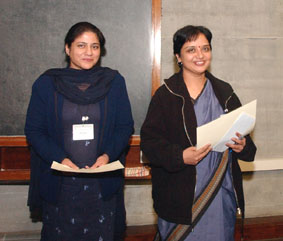
Imrana Ashraf Zahid (left), Department of Physics at Quaid-e-Azam University, Islamabad, Pakistan, and Revati N. Kulkarni, International Institute of Information Technology, Pune, India, are the winners of the 2004 ICO-ICTP Prize. The awards ceremony took place on 10 February during the Winter College on Interferometry and Applications in Modern Physics. Established in 2000 through an agreement between ICTP and the International Commission for Optics, the award is given to scientists, younger than 40 years of age, who are pursuing optics research in developing countries. Winners receive a certificate and a cheque for US$1000. For additional information, see the 'awards' page on the ICTP homepage at www.ictp.it.
Networked Society
How does information disseminate briskly and broadly within a
community, especially a community that is well networked? A mathematical
model examining how such dynamic interaction takes place is presented
in an article, "The Rise and Fall of a Networked Society:
A Formal Model," published in a recent issue of the Proceedings
of the National Academy of Sciences, that is co-authored by
ICTP staff scientist Matteo Marsili, Fernando Vega-Redondo
(Universidad de Alicante and Universitat Pompeu Fabra,
Barcelona, Spain) and Frantisek Slanina (Academy of Sciences of
the Czech Republic, Prague). Marsili, who joined the Centre's
Condensed Matter Physics group in 2002, focusses his research
on applications of statistical physics to economic and social
systems. For the full text of the article, see www.pnas.org.
Alvaro de Rujula, a world-famous theoretical physicist
on the scientific staff at CERN (European Laboratory for Nuclear
Research), Geneva, Switzerland, was the first speaker in the ICTP
public lecture series, "Frontiers," that has been organised
to celebrate the Centre's 40th anniversary. Immaginario Scientifico
is assisting ICTP in this effort. De Rujula, who spent five months
at ICTP in 1966 when the Centre was still headquartered in downtown
Trieste, spoke before a packed audience in the Kastler Lecture
Hall at the Adriatico Guesthouse on 25 March. In his lecture,
"The Latest News from the Big Bang," de Rujula explored
the mysteries of the origins of the universe (see www.immaginarioscientifico.it). For additional
information about the lecture series, contact pagan@ictp.trieste.it.
Leading Scientists,
Leading Prizes
George Ellis, a leading theoretical cosmologist who
is a professor of applied mathematics at the University of Cape
Town, South Africa, has been awarded the 2004 Templeton Prize
for his contributions to "the dialogue at the boundary of
theology and science." Ellis, who served as professor of
cosmology at SISSA (International School for Advanced Studies)
from 1987 to 1994 (see "Going Home," News from ICTP, Winter
2003-2004), will receive the prize in a private ceremony at Buckingham
Palace, London. Accompanied by a cash award of US$1.4 million,
the Templeton Prize is one of the world's largest annual monetary
prizes given to an individual. Another important scientist closely
linked to ICTP's activities, Fields Medallist Sir Michael Atiyah,
University of Edinburgh, UK, is the recipient of the Abel Prize
for 2004, given by the Norwegian Academy of Science and Letters.
Atiyah will share the prize with Isadore M. Singer, professor
of mathematics, Massachusetts Institute of Technology (MIT), Cambridge,
USA. The Abel Prize carries a cash award of about US$1 million.
Atiyah, who served as president of the Royal Society, UK, is a
founding associate fellow of TWAS (Third World Academy of Sciences)
and helped to launch the IAP (InterAcademy Panel on International
Issues), both located on the ICTP campus (see "Sir Michael Atiyah,"
News from ICTP, Summer 2003).
